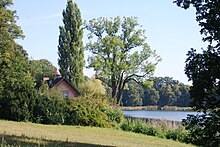Job von Witzleben (Colonel)
Job Wilhelm Henning Dietrich von Witzleben (born August 4, 1916 in Copitz , † 1999 in Lenggries ) was a German officer in the Wehrmacht and the National People's Army.
Life
Job von Witzleben was the eldest son of the Oberregierungsrat Dietrich von Witzleben. He grew up in Saxony and received his education at the Königin-Carola-Gymnasium in Leipzig . In the Hitler Youth he achieved the rank of a follower leader. On February 1, 1935, he became a member of the National Socialist German Workers' Party (membership number: 3590830).
At the beginning of the attack on Poland he was a lieutenant. In 1940 he lived in Bautzen , where he was a lieutenant in the 103rd Infantry Regiment. He was promoted to captain in Grenadier Regiment 192 of the 56th Infantry Division . In the autumn of 1943 he began training in the general staff courses . He was first general staff officer in two divisions . In April 1945 he was taken prisoner by the Soviets near Königsberg (Prussia) . For three years he remained in the prisoner-of-war camp in Krasnogorsk , where he joined the Association of German Officers . He is said to have been a "re-education teacher" in POW camps. Formally he was a prisoner of war, but with special freedoms.
He returned to Germany in 1948 and became a member of the Socialist Unity Party of Germany . In the rank of major he began to take part in the establishment of the barracked people's police . On September 15, 1953, he came to the newly formed Troop Command North in Pasewalk . When the National People's Army was established on March 1, 1956 , it became Military District V and Witzleben became an NVA officer. At the end of 1957 he was recalled from this command. When the Institute for German Military History was founded in Potsdam on March 15, 1958 , he started working there. He retained the rank of colonel. He worked as a military history advisor on numerous films. He left the NVA in the 1960s. He later had the ambition to be “Colonel i. G. “ to be designated by the Bundeswehr .
Private
Job v. Witzleben with a v. Brauchitsch . She divorced him because she did not want to move to the GDR. His second wife was Anka geb. Hannak . The daughter Waltraud worked in the "Reich" of Alexander Schalck-Golodkowski (KOKO). Her husband Arthur Schuster was Günter Mittag's son-in-law (and probably also an employee of the Federal Intelligence Service ). Before the fall of the Wall and the peaceful revolution in the GDR , Waltraud and Arthur Schuster - who took the name Witzleben after their marriage - sat down on a trip abroad to Bavaria . Around 1990/1991, Job-Wilhelm v. Witzleben and his wife to Bavaria (not to Saxony). He died in Lenggries at the age of 83. The widow lives in Bad Tölz.
Honors

- German Cross in Gold (April 24, 1943)
- Heinrich Greif Prize (1966)
- Friedrich Engels Prize (1970)
- Patriotic Order of Merit in Gold (1976)
Fonts
- The Bundeswehr - a dangerous but futile instrument of West German imperialism and militarism. Institute for German Military History, Potsdam 1965.
- Bundeswehr: Army of Revenge. Problems of the development of the Bundeswehr. German military publisher , Berlin 1965.
- The use of the HVA forces to secure the III. World Festival of Youth and Students in Berlin in the summer of 1951. Institute for German Military History, Potsdam 1970.
- The conspiracy of July 20, 1944 - no national alternative for the German people. In: The National Committee "Free Germany" and its military-political significance. Institute for German Military History, Potsdam 1963.
- Stauffenberg and the National Committee Free Germany. A repressed chapter of German resistance. Documentation. Berlin 1990.
Movies
- Liberation (film) (5 feature films): Expert advice on military history
- My zero hour : Expert advice on military history
- Secret command matter (7-part TV series): Screenwriter together with Klaus Alde, Gustav Wilhelm Lehmbruck, Egon Schlegel
literature
- Daniel Niemetz: The field-gray legacy. The Wehrmacht Influences in the Military of the Soviet Zone / GDR. Berlin 2006, ISBN 3861534215 .
- Gothaisches Adeliges Taschenbuch, Gotha 1940, p. 688.
Web links
- Literature by and about Job von Witzleben in the catalog of the German National Library
- Job von Witzleben in the Internet Movie Database (English)
- Active in the resistance against Hitler. Article in the Potsdam Latest News on Job von Witzleben
Individual evidence
- ^ Queen-Carola-Gymnasium Leipzig: Directory of teachers and pupils 1934 to 1935 , Leipzig 1935, p. 3.
- ^ Olaf Kappelt: Brown Book GDR: Nazis in the GDR. Historica: Berlin 2009. ISBN 9783939929123 . P. 574.
- ^ Kurt Finker : Stauffenberg and July 20, 1944. Pahl-Rugenstein: Cologne p. 234
- ^ Daniil Melnikow: July 20, 1944: Legend and Reality. Deutscher Verlag der Wissenschaften: Berlin 1967 p. 172.
- ↑ Investigative Committee of Freedom Jurists : Former National Socialists in Pankow's service. Berlin 1960, p. 99.
- ^ Wolfgang Brose: The Pasewalk garrison . ISBN 978-3938525142 . P. 57
- ↑ Klaus Froh, Rüdiger Wenzke: The generals and admirals of the NVA: A biographical manual. Christoph-Links-Verlag: Berlin 2007 p. 240
- ↑ My zero hour . defa.de.
| personal data | |
|---|---|
| SURNAME | Witzleben, job from |
| ALTERNATIVE NAMES | Witzleben, Job-Wilhelm Henning Dietrich von (full name) |
| BRIEF DESCRIPTION | German officer in the Wehrmacht and the NVA |
| DATE OF BIRTH | 4th August 1916 |
| PLACE OF BIRTH | Copitz , Saxony |
| DATE OF DEATH | 1999 |
| Place of death | Lenggries , Upper Bavaria |